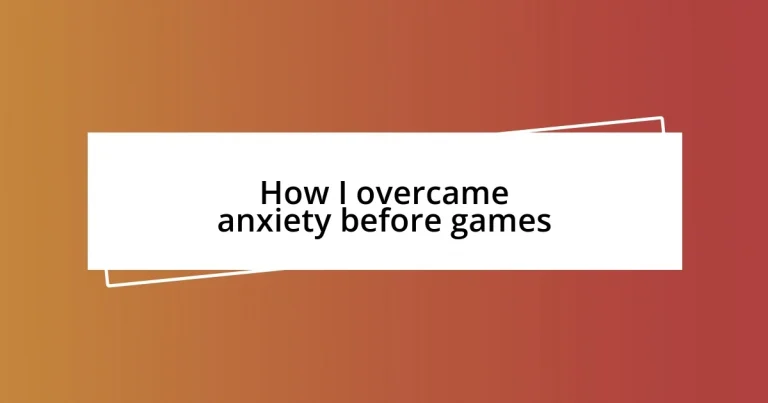Key takeaways:
- Understanding and recognizing anxiety triggers, such as performance pressure and environment, helps athletes manage their feelings effectively.
- Implementing breathing techniques and developing a consistent pre-game routine fosters mental clarity and emotional control before games.
- Seeking support from mentors and teammates, along with reflecting on post-game experiences, enhances personal growth and alleviates the burden of anxiety.
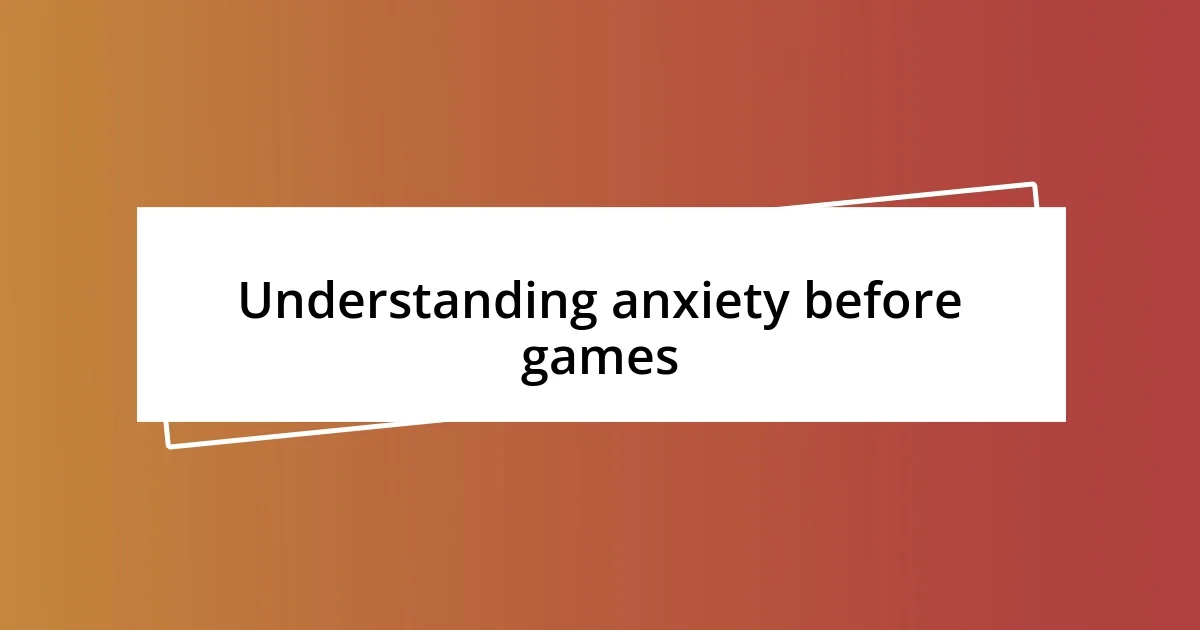
Understanding anxiety before games
Anxiety before games is a common experience, one that can strike anyone, regardless of their skill level. I remember one match where my heart raced so fast I thought it might jump out of my chest. It’s that overwhelming feeling of pressure combined with the fear of failure that often clouds our minds just as the game is about to start.
What I’ve learned is that this type of anxiety can stem from the desire to perform well and meet expectations, both self-imposed and external. Have you ever felt that pit in your stomach as you prepare? I often found that the more I focused on the outcome, the more the anxiety spiraled. It’s as if the anticipation of potential disappointment constricts your ability to enjoy the moment.
Understanding the roots of anxiety is crucial. Sometimes, acknowledging how I felt helped to diffuse the tension. Just recognizing that I wasn’t alone in my feelings made a difference. Have you ever noticed how sharing your worries can lighten the load? It’s this shared experience that not only connects us but also helps in reframing those anxious thoughts into something more manageable.
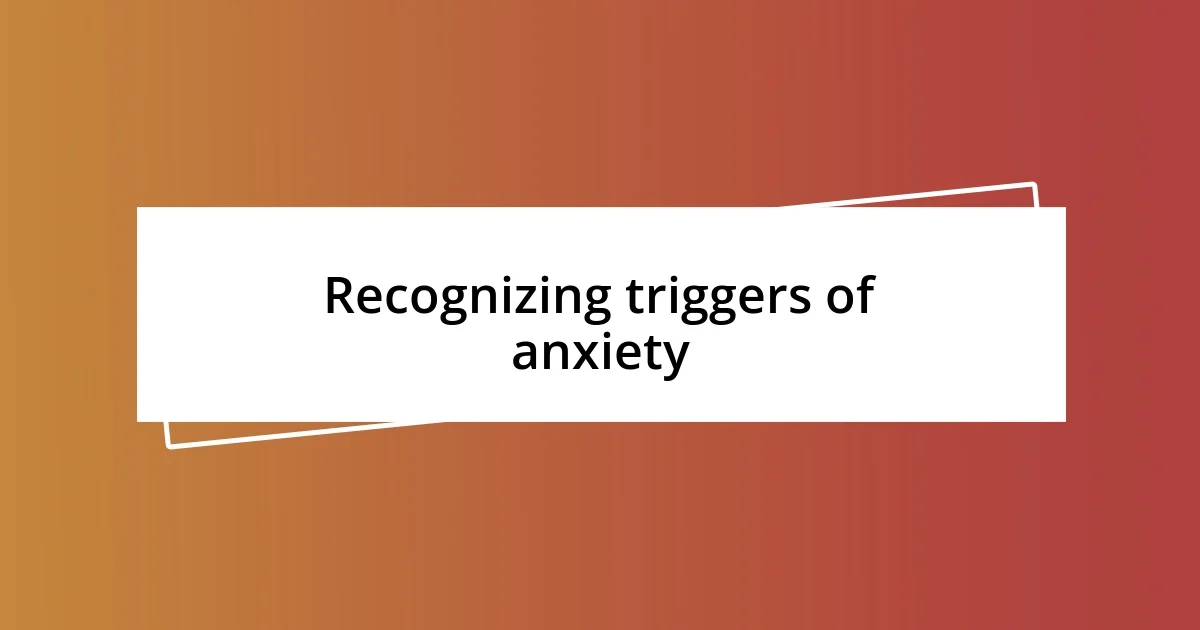
Recognizing triggers of anxiety
Recognizing the triggers of anxiety is a critical first step toward managing it effectively. For me, understanding that certain situations triggered my anxiety was transformative. I realized that moments leading up to the game, like waiting in the locker room or hearing the crowd, would ramp up my heart rate. Each time I found myself in those situations, I would take a pause to identify what feelings arose, and it helped me become more aware of my reactions.
Reflecting on these triggers often brought clarity to my experience. For instance, when I focused on specific opponents or heightened expectations from my coach, I noticed my anxiety would spike. Recognizing these patterns allowed me to prepare mentally and emotionally, shifting my mindset from fear to focus. I learned to ask myself, “What’s the worst that could happen?” This simple question often diffused my anxiety’s grip.
To truly understand anxiety, I found it beneficial to map out my triggers. It was eye-opening to see how certain thoughts or situations linked to my anxiety. The process made me feel more in control, allowing me to approach each game with a clearer mind. Maybe you could try this as well—jot down what specifically makes you anxious, and see if patterns emerge that you can address.
| Trigger Type | Example |
|---|---|
| Physical Environment | Crowd noise or locker room atmosphere |
| Social Situations | Facing skilled opponents or pressure from teammates |
| Personal Expectations | Desire to win or fear of underperforming |
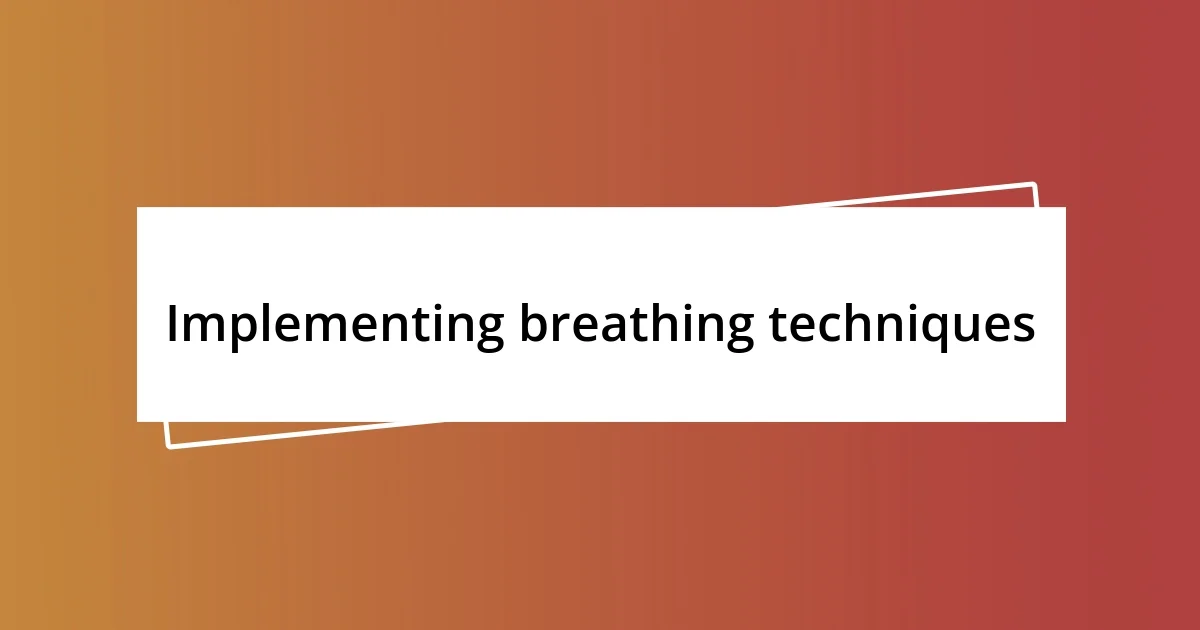
Implementing breathing techniques
Implementing breathing techniques became my lifeline before games. Whenever that familiar wave of anxiety washed over me, I turned to my breath to regain control. Deep, intentional breathing helps calm the mind and quiets racing thoughts. I remember using a simple technique called the 4-7-8 method: inhale for four seconds, hold for seven, and exhale for eight. It feels almost magical how a few breaths can ground you and shift your focus.
Here’s a quick breakdown of effective breathing techniques I found helpful:
- Deep Belly Breathing: Place your hand on your stomach, inhale through your nose, feeling your belly rise, then exhale through your mouth.
- Box Breathing: Inhale for four seconds, hold for four, exhale for four, and hold again for four before repeating.
- Alternate Nostril Breathing: Close one nostril, inhale deeply through the other, switch nostrils while holding the breath, and exhale through the opposite side.
Incorporating these methods not only helped me in the moments leading up to the game but also became a ritual that steadied my nerves, making the whole experience much more enjoyable. I found comfort in knowing I had a simple tool at my disposal—my breath—and that was incredibly empowering.
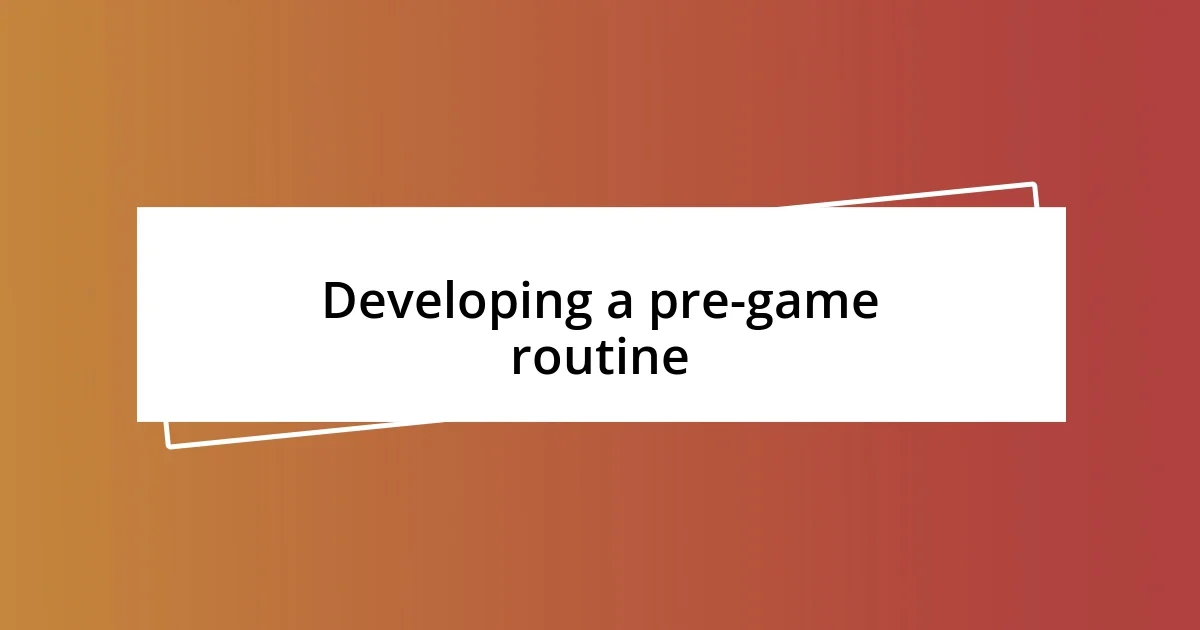
Developing a pre-game routine
Developing a pre-game routine was essential for me in managing anxiety effectively. I remember the days when I would feel overwhelmed just thinking about the game. Creating a consistent routine helped to anchor me. For instance, I would always start my preparation two hours before the game; the first step was getting into the right mindset with music that pumped me up.
In my routine, I also included visualization exercises where I would close my eyes and picture myself in the game, executing plays, celebrating successes, and overcoming challenges. I often found myself thinking, “How do I want to feel when the whistle blows?” This question guided my visualizations and allowed me to align my emotions with how I wanted to perform. It was a game changer—literally!
Additionally, involving my teammates in my routine added another layer of comfort. We would gather before the game for a quick ritual—a handshake, a chant, or just sharing our thoughts. Those moments created a sense of camaraderie and reminded me I wasn’t alone in facing the challenge ahead. I realized that when everyone is in sync, it elevates the energy and calms my nerves at the same time. Have you ever noticed how shared experiences can lift pressure off your shoulders?

Visualization strategies for success
Visualization played a pivotal role in my journey to managing anxiety before games. I recall vividly those pre-game moments when I would close my eyes and transport myself onto the field, visualizing every pass and every goal. It wasn’t just about seeing the plays unfold; it was about feeling the rush of adrenaline and the satisfaction of executing each move flawlessly. Why did this work for me? Because imagining success created a mental blueprint that made it feel attainable when the whistle blew.
One effective strategy I developed was to create vivid mental imagery of not just my best moments but also the challenges I might face. I would think, “What if I miss that goal?” and then visualize how I would respond—shaking it off and focusing on the next play. This practice of mentally rehearsing tough scenarios became essential. I began to realize that my mind, just like my body, needed the training to handle pressure situations with confidence. It gave me a real sense of control over my performance, transforming anxiety into anticipation.
I’ll never forget the time I visualized myself scoring the winning point in a crucial match. That moment of triumph became ingrained in my mind, and when it happened on the field, it felt surreal yet familiar. I learned that these visualizations weren’t just wishful thinking; they were my way of programming my mind to succeed. Have you ever tried to visualize your success? You might be surprised at how profoundly it can change your experience in those high-pressure moments.
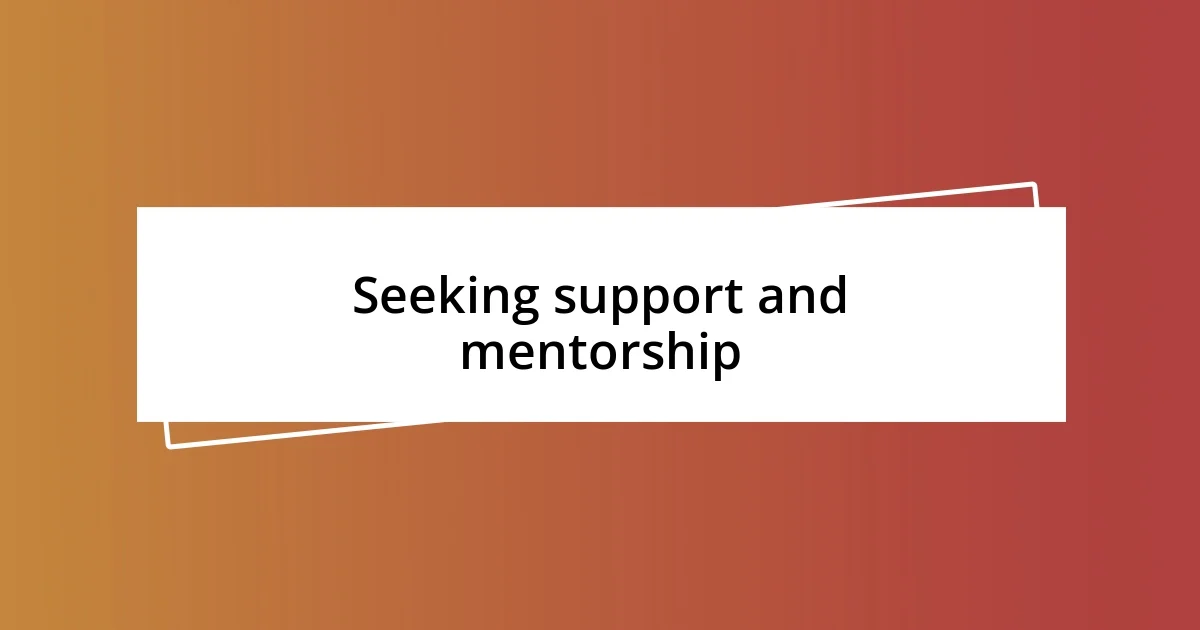
Seeking support and mentorship
Reaching out for support and mentorship was a game changer for me in managing my anxiety before games. I remember talking to my coach, who not only had an incredible understanding of the sport but also a genuine understanding of the mental challenges athletes face. One key takeaway from our conversations was that vulnerability is a strength, not a weakness. Have you ever considered how sharing your fears with someone who’s walked the same path can lighten the load?
Finding a mentor in my journey played a significant role in shaping my approach to the pressure of competition. My mentor shared invaluable lessons about his own struggles, which helped normalize what I was feeling. It sparked an idea within me: maybe I didn’t need to battle anxiety alone. Have you ever thought about how sharing experiences can foster a deeper connection? I found that expressing my concerns not only eased my nerves but also built a trusted support network that I could lean on.
Engaging with my teammates also formed another layer of support. We started holding weekly meetings not just to review game strategy, but to openly discuss our fears and anxieties. I distinctly recall one session when a teammate confessed his nervousness about an upcoming match, and to my surprise, everyone else shared their own moments of doubt. It was cathartic, highlighting that these feelings are universal in competitive sports. Isn’t it liberating to know that we’re all in this together, supporting each other through our highs and lows?
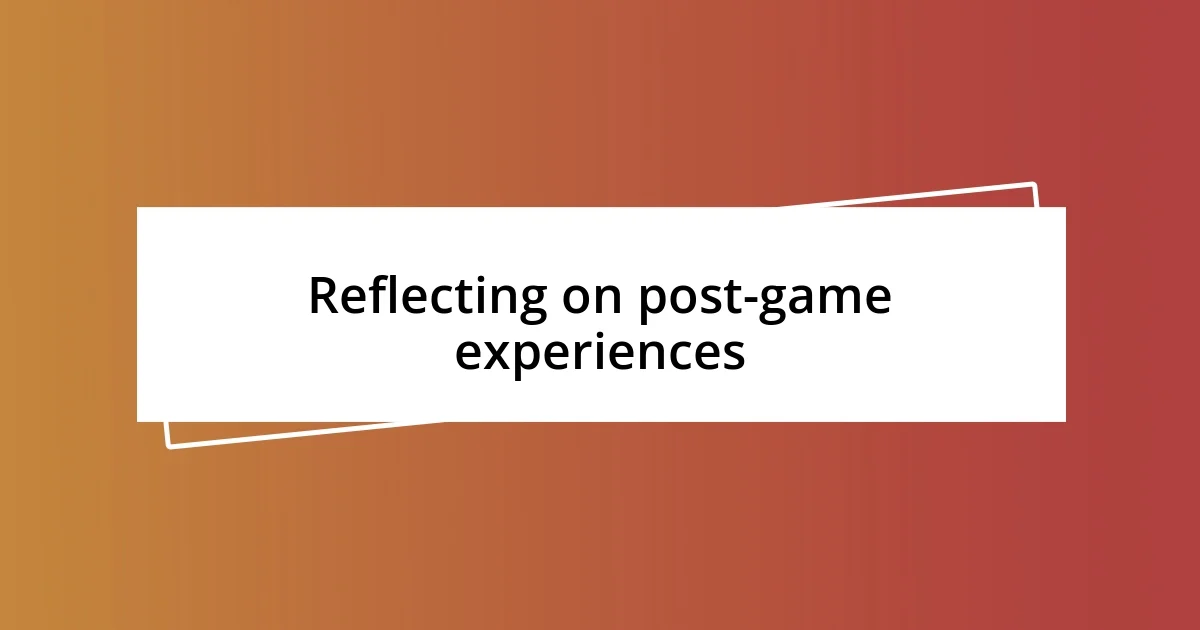
Reflecting on post-game experiences
After the game, I often found myself reflecting on how I felt during play. I remember one particular match that didn’t go as I had envisioned; my heart sank with each missed opportunity. However, when I took the time to analyze my emotions later, I discovered that those moments of disappointment sparked an urgency to improve and adapt. Have you ever experienced that bittersweet feeling of regret transforming into motivation? It taught me that even the tough experiences could be rich with lessons.
There were games where I felt like I completely crushed it, and the post-game exhilaration was intoxicating. I’d sit back, allowing myself to enjoy the high of a great performance, recalling each standout moment vividly. Celebrating those successes wasn’t just about the win; it was about reinforcing the idea that preparation and mental strength truly paid off. I often wonder if that blend of joy and relief contributes to a healthier mindset in the long run.
Revisiting my post-game feelings encouraged me to acknowledge not just the outcomes, but also my growth as an athlete and a person. There were nights I lay awake, reliving the game in my mind—not just focusing on the scoreboard but on how I reacted under pressure. Those reflections became my personal development time, prompting me to ask, “What did I learn today?” Embracing this practice helped heighten my self-awareness and, in turn, equipped me for future challenges. Isn’t it fascinating how our mind can be such a powerful ally when we take the time to delve into our experiences?












